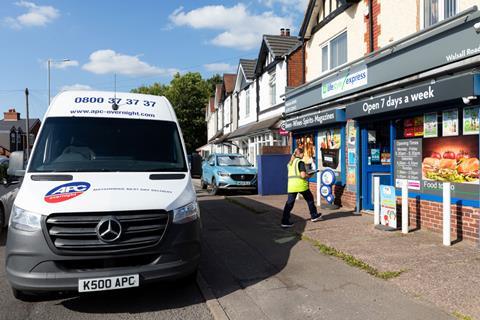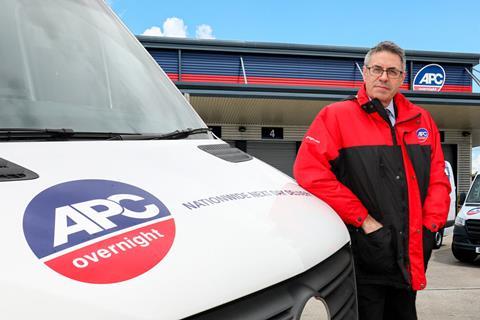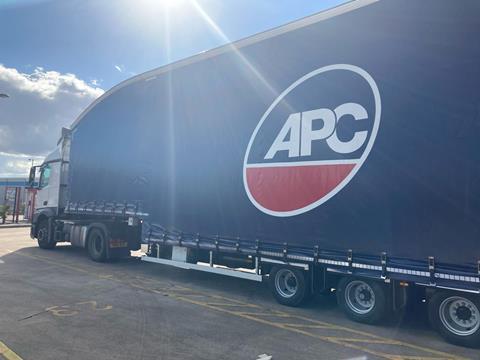The APC was founded 30 years ago as The Alternative Parcels Company and still has an unusual ownership model in the parcels world, in that it is owned by its 103 independent, entrepreneurial delivery-and-collection couriers.

Focus has shifted to the B2C next-day express parcels market serving small to medium enterprises (SMEs), and The APC relocated its headquarters from Essington to a £16.5m, 138,000sqft national hub at Lakeside, Cannock in 2014. But, responding to growth in the business, APC reopened its 60,000sqft Essington hub in 2016.
Jonathan Smith became chief executive of The APC in April 2015 and has 35 years’ experience in the parcels sector, starting with Red Star and including spells at City Link, DHL Express and Yodel. He describes leading The APC as “the best job I have ever had”.
“I have never been happier than I am here,” he says. “The company went through a difficult period when it was building the new hub but that is behind us.”
The APC network was created when a group of local same-day couriers saw an opening for a national next-day parcels network and got together with the aim of creating an alternative to TNT, which was then pioneering express parcels in the UK.
“The members still run same-day businesses but that is completely independent of The APC,” explains Smith. “Our members tend to have APC and same-day, most have pallets and a few have haulage. We are considering a national same-day network but Covid pushed those plans back a bit.”
The APC’s standard service is next-day for parcels with maximum dimensions of 1,200mm x 550mm x 500mm and 30kg in weight, but it has introduced a number of special services including timed deliveries and oversize, fragile or high-value products.
“We do what we call non-conveyables, which are slightly heavier traffic,” says Smith. “We are strong in niches like fragile and liquids; we do a lot of craft beer and wine, for example. Around 60% of our volumes are now B2C.”
Like many in the parcels sector, the Covid-19 pandemic was an exceptionally busy period as people were forced to stay at home and shop online.
“It didn’t go crazy straight away,” says Smith, pictured. “We spent a lot of time ensuring our people’s safety, then eight weeks into it we started to see 20% or 30% growth. We had to work pretty hard to keep our service levels up in that period, but we made great profit and maintained our Trustpilot ratings [currently standing at 4.6/5].
“The depots are very good at standing up to volume increases – they can flex very quickly. We had the luxury of having the second hub at Essington as we kept it when we opened the new one, and thank goodness we did. We use it a lot when we need to increase throughput at peaks like Christmas.”
In contrast to the boom of Covid-19, Christmas peak 2023 was “pretty flat on the year before”.

“We have come out in 2024 being marginally up but it’s not a very vibrant market,” says Smith. “That has to be put in context – The APC has never grown more than 5% a year except in Covid. We have 30,000 customers who use us at least once every two or three months and they are quite resilient, so even in a downturn we have never suffered too much.
“It is an interesting customer base, and many new businesses came through in Covid which partly drove our volume growth. A lot of breweries and restaurants also turned to online in the pandemic.”
Future capacity
Over the past few years The APC has invested £6m in extra capacity, including a new sorter at the Cannock hub and renewing the fleet of linehaul tractors and trailers to future-proof the business for its anticipated growth.
“We can now see a runway of seven or eight years where we have enough capacity, partly because of the second hub,” says Smith. “People say it’s a luxury to have the second hub but it has served us well.
“When I started I had two offers in the first week to buy it and luckily I said no. It is an incredibly strong site and we would never get permission to build that hub in Essington now.”
The APC does not call upon its members to fund the network and all recent investments have been paid for from profits with the support of Barclays Bank. “They have been fantastic over the years,” says Smith. “They understand the business well and it shows the beauty of a long relationship with a bank. We don’t spend what we can’t easily afford.”
When he was appointed in 2015, Smith was the first external chief executive, as all his predecessors were drawn from member companies.
“The APC and I are an interesting marriage,” he concedes. “I have a largely corporate background, the members are largely entrepreneurial and we now have the best of both. I’ve learnt a lot from them and hopefully they have learnt something from me. A lot of our members run big businesses of their own, to be fair.”
The ownership model was changed in 2020, just as Covid-19 took off in the UK. The business was previously owned by 36 shareholders, 32 of whom were founder depot owners, with the other depots operating under a licence arrangement.
“Management had a small shareholding but the majority of shares were held by the people who set it up,” says Smith. “That seemed to me to be unfair, especially for the depots that we used to call agents who had no shareholding.
“We did a financial restructure with some money from Barclays. The management got a bigger stake and we gave shares to every depot – not as many as the legacy shareholders, but now pretty much every depot has some skin in the game.”
Maintaining harmony
The company is run day to day by a board of four executives and four depot members, but Smith says The APC is a proper democracy.
“Outside the AGM we have four shareholder catch-ups every year,” he says. “The most common issue for me is that no two members want the same thing and that can be a challenge.”
As with a pallet network, some members are net inputters while others receive more parcels than they send to the hub, and harmony can depend on keeping volumes in balance as far as possible.
“We make different payments to depots we recognise will always have an imbalance and we offer marketing support – although sales are always done at depot level,” says Smith. “We have to recognise that parcels is an unequal game and some parts of the country are always going to dominate.
“We are strong in the North, Midlands and South East and then there will be areas with lower density and higher mileage, which we support.”
While there are strengths in an entrepreneurial business model where depots sink or swim depending on their own efforts, this can make it hard to enforce the consistency in service standards across the country that a corporate network is able to insist on.
“We are KPI-obsessed and that is probably something I’ve brought,” says Smith. “At 9.30 every morning the whole team looks at 30 different suites of KPIs so we will know if a depot had a problem the day before. That is the only way to manage it.”
While the membership of 103 has fallen from highs approaching 120 before Smith arrived, he acknowledges that some people say it is still too many; Yodel, for example, manages with 50.
“It looks a lot,” he says. “But what customers say they most like about The APC is their proximity to a local depot and that they are dealing with another SME. We trade off higher trunking costs against the fact we are nearer to the customer at the other end.
“It also means our depots are not shy of collecting two or three times a week from a small SME business. They get to know the people and we will never have a central call centre – every call goes to a local depot.”
New members
If a territory comes free for any reason it can be offered to a neighbouring depot owner, and a handful of members own more than one depot, a couple having three. But the network is still keen on bringing in new people.
“We’ve had six new entrants in the last two years,” says Smith. “We don’t have high churn and two-thirds of our depots are second generation. One is on the third generation. But we have a rule that no depot owner can have more than 6% of our deliveries.”
New entrants to The APC will buy their shares from the previous owner, the value being what they believe it will be worth in the future.
After 35 years in the business, Smith says the trick to making money out of express parcels is actually fairly simple.

“You have to know your market and not be tempted out of it,” he says. “We get approached by tier 1 retailers and we say ‘it doesn’t work for us’.
“So know your market, give a great service and charge appropriately. The APC does not set out to compete on price and never will. I don’t like to talk about competitors but some people have been pulled out of their core market.”
Helping the membership decarbonise
Large corporate parcels networks have more levers to pull when it comes to the speed at which they decarbonise deliveries than The APC, with its network of self-employed businessmen at the sharp end of delivering the goods.
But there are things happening behind the scenes. “We have depots with electric vehicles and cargo bikes in city centres, so there is a lot going on at depot level,” says Smith. “There isn’t a massive amount we can do to help them and they have to get their own subsidies where they can.
“A lot of depots also have solar panels fitted and one of our founders, Quentin Abel in APC Manchester, is very big on solar.”
The hubs are doing their bit, with low-energy lighting and an 80% reduction in the waste sent to landfill in the last five years. “We aim to be net-zero carbon emissions at the centre in the next four or five years,” says Smith. “With our depots being independent businesses it is slightly different from the corporate networks. But we are getting there.”
Getting customers to pay more for decarbonisation is a challenge for any logistics business and the fiercely competitive world of express parcels is no different. But The APC has a secret weapon.
“Our depots are masters of explaining to customers about passing on costs when we need to,” says Smith. “This industry said for years ‘why don’t we have regional pricing?’ but it never happened because the corporates can’t work it out.
“We have regional pricing because each depot charges what it thinks is the right rate. Our member in Bristol is big on cargo bikes and he sells that message really well to his customers.”
Giving consumers more delivery choices
Consumers waiting for a parcel now have high expectations of the information and options they will be given on their delivery.
Smith complains that a lot of these apps have been developed at high cost and given away to shoppers, but The APC has had to keep pace.
APC Direct allows customers to book and track their deliveries, APC Expect gives the recipient a two-hour window and APC Choice then offers alternatives if that window is not acceptable. APC PinPoint tracks the delivery driver. “They have all been developed in the past seven years,” says Smith. “We offer pretty much everything shoppers could want.”
The APC has joined Parcelly, a relatively new network of 1,250 parcel pick up and drop locations, to add another choice to the ‘Leave safe’ option in APC Choice. These are more likely to be local independent retailers and charity shops than large national chains.














